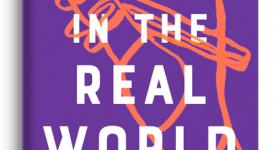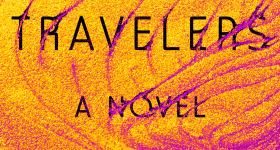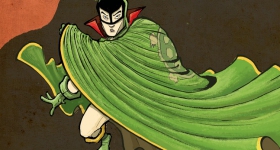By Serena Lin
Just a little bit farther. The rock grated against the dirt, leaving lime and sandstone, rubbing bits of dust into the private’s hands. He crawled a few more inches on his belly. He tried not to breathe too heavily, afraid that even surrounded by his company, he was not yet safe. A bead of sweat trickled from his temple down to the collar of his uniform.
Right in front of him was a building, half-shelled, torn. It lacked a roof. Mildew crept up along its sides, already blackened by soot and ash – the stain of grenades. From the remains, he could tell it had been painted white, with peach and blue tile trimming. Now it was just a husk of faded colors. But there were people living inside.
His helmet strap bit into his neck as he crept forward. Private Kohrdad was afraid and trying to concentrate on everything except his fear. His stomach itched as pebbles crept under his uniform, scraping his wrists and ankles. His hips felt removed, as if they were trailing behind his shoulders and arms, which were straining to bring along the rest of him. His muscles tensed. His legs were useless stumps, numb from the night's watch; he and his company had stayed in position because it was unsafe to proceed. When the sun came up, the assault team would put the C4 in the building, retreat a few hundred feet, and then they’d blow the place up.
Earlier, the sounds of a child crying for water from the building interrupted the silence, a woman’s hush-hush. Three, maybe four or five men were inside. The men had been arguing in low voices, something about sickness -- the urgency of leaving, the thread of desperation sewn through their quarrel. The murmuring became yelling, and a voice had emerged, warning the others to be quiet. Something heavy dropped and clattered hollowly against the floor.
Only a few days ago, his entire company had been ordered to this southern town, a speck too nondescript to be rendered on a map. They were told that insurgents were present and to watch their movement. He knew the enemy was inside this house. Somebody with a name that sounded like الرّئيس – the Arabic word for boss – lived inside. Kobe understood that capturing this man was essential to the morale of his unit.
God, he was thirsty. There was never any goddamned water. How he missed home. He missed his mother the most, his throat parched and rough from the heat. He missed her way of listening to him. He didn’t even need to speak sometimes. She could hear his feelings even while she was standing in another room. When he was hungry, he considered his family. In the pocket sewn behind the left breast of his jacket, there was an old black and white photo of his father, a grin on his face, his arm around Kobe’s mother, the two of them perched on a blue bluff overlooking the Grand Canyon. Between rations of tinned beef, he thought of his father’s glasses forgotten on the coffee table and the ensuing overturning of couch cushions to find them. Pears in syrup caused him to recall his father holding the prize squash he’d grown in his garden, proud as any sport fisherman bearing a fifty pound marlin. While breaking off a square of Hershey’s tropical formula chocolate and folding down each corner of the foil packet to preserve the rest of the bar, Kobe remembered the day he informed his parents that he was joining the army. His father had walked out of the room rubbing his arthritic shoulder, stooped over.
“Do you want to be killed?” his mother had asked.
“I met these guys at the mall a few weeks ago. I can get a great job after I get training. It’s exciting.”
His mother sat down on the couch, studying her hands.
“Padi. Oh my Padi. We didn’t come here for --”
“For me. You don’t understand. Everybody hates us.” His voice was loud, his mother wincing as each word hit her. When had he started yelling?
She did not look him in the eye. “Don’t you respect us anymore?” she said. She raised her head, stared at him. “Padi?”
She sobbed. He bent down and hugged her. He had fallen down riding his bicycle when he was nine, and he held her now the same way she did then, in a comforting embrace. When she finished crying, Kobe stood up to go speak to his father. His mother didn’t move from the couch. She blinked slowly, unfocused. He never knew why he did it, but he grabbed her by the shoulders and shook her. She felt limp and unexpectedly light. “Mom?” he pleaded. She did not speak until he was inches beyond the doorway. The doubt in her voice seeped into his stomach.
“Don’t, Padi.”
Charles had crept up on his right, his face smeared with grime. Charles, who had bug eyes that made him look scared all the time (“Moon eyes!” his mother would called them); Charles, who had a three-legged French bird dog named Tresure, and who never stopped talking about Birdie -- the girl he had liked since junior high had sent him several nude pictures in naughty poses. He claimed she had finally hit it big out in the San Fernando Valley. Charles laughed like he had taken too many drugs, a staccato barking interrupted by high-pitched wheezing. Looking at him, Kobe wanted to hear that laugh. Charles raised his hand and pointed at the building where the Lieutenant knelt.
The Lieutenant motioned to Kobe. Rays of light were appearing; the sun would be visible within the next half hour.
Lieutenant Jackson’s skin was so dark that the green camouflage makeup was invisible on his cheeks. He had a proudly hardened face; slightly slanted eyes gave him an unreachable intensity. Thick, pulsating veins twined around the Lieutenant’s forearms until they disappeared at his knuckles. Kobe almost never saw the Lieutenant’s hands without his rifle. The rifle was an extension of the Lieutenant's being. In Kobe’s nightmares he stared down the barrel of the Lieutenant’s rifle while he knelt, his hands tied by the Lieutenant’s veins, the Lieutenant’s blood washing over him.
The Lieutenant never commiserated with his men about their fatigue or hunger. If a soldier complained, the Lieutenant ordered him to walk point the next day. Often, he would stride to the front of the line, then begin marching backward as if to remind the entire company that despite precautions, there was no point in watching the road in front of them -- a soldier was always destined to trip a wire or step on a mine; they were helpless to protect themselves.
A few weeks ago the Lieutenant stopped short of an old artillery shell that turned out to be a half-buried IED. “Halt,” he said.
Sherrod, a sharp-eyed, weasel-nosed pink-faced Southerner leaned down from his tank and yelled, “Jesus, there’s a mine!” The Lieutenant stopped, scratching his beard casually. He ordered the men to flank him and drop down. Stones flew, gunfire surrounded them. Kobe grabbed his side as a rock hit him hard. “Hold Fire!” The Lieutenant yelled. “Hold Position!” There were no hostiles in sight.
The Lieutenant ordered them all to fall back. As soon as the entire group retreated nearly 200 feet, the Lieutenant grabbed one of the prisoners and held his Beretta M-9 to the man's back. “You -- walk forward.” The man refused, trembling. The Lieutenant cocked his pistol and pushed the man forward. The man began to march back to where the company had been attacked. The shooting had stopped.
The man realized he was being set free and shouted in Arabic. Kobe understood what he was saying. “Not American! Don’t shoot! Don't!” He emitted a loud, horrible sound. Pieces of dirt rained down, covering Kobe’s sleeve.
At camp, Kobe learned that there had been a trip wire in their path. Somehow, the Lieutenant knew the danger. The Lieutenant had insisted they keep the prisoner with them through hundreds of miles with low rations. When a private had mocked the man, the Lieutenant used the butt of his M249 saw and rammed it into the private’s stomach. They had fattened the man like a pig for slaughter. The Lieutenant had made the first and last cut.
The Lieutenant rarely said anything to explain himself. Kobe heard stories about Lieutenants who spoke with their men; who, huddled at night under the thin, standard-issue green blankets they all carried, shivered with the men. Kobe’s Lieutenant was a singular being. He did not share. He slept in a separate tent.
Watching the building, Kobe felt lonely. A snake slithered a few feet away, weaving through weeds and dirt, enduring the long night before it could strike. “Do they smell us?” Kobe wondered. His legs had gone numb. He stank of urine and sweat, as did the four others around him including the Lieutenant. He at least smells like a human being, Kobe thought.
A slow light began to sketch shadows into the horizon. Kobe wished he had slept. He had an extra half kilo of C4 in his bag. He was specially trained to arm the satchel charge. Finally, he could move from his wretched position. He slid slowly to the edge of the house where he could monitor the charge he had prepped. The assault team had already secured the charge in its proper place.
The night before, Kobe had slowly primed the explosives. He set and armed the trigger mechanism, mounting the blasting cap and attaching the wire to the clacker. He carefully finished the entire device and stabilized it. Three minutes and 23 seconds.
“Padi.”
It wasn’t a world record, but he was sure it would work. They were going to use the device as a last resort to flush everybody out. He worried that not everything was perfect, so he attached and set a time fuse in case the remote detonation didn’t work. Three minutes. 23 seconds.
“Padi.”
It wasn’t long, but it was good enough. The place would blow. Either way, the place would blow. When he was finished, he placed the bomb gently inside a drab olive canvas bag. He didn’t have the actual clacker on him. Charles had it so he could set off the blasting cap, and all he had to do to set off the explosives was flex his fingers as if he were holding a hand exerciser. Kobe and the company would be positioned a safe distance away. The Lieutenant would be pleased with what Kobe had rigged.
Their mission designation was simple -- terminate or capture Dr. Kalifti Hussein, who knew the whereabouts of men who knew the whereabouts of Saddam. The Lieutenant and everybody else in the company eased into position. The Lieutenant lifted a megaphone. The grenadier pointed his launcher.
“Dr. Kalifti Hussein, you are surrounded. Come out slowly. Lay your weapons on the ground.”
Kobe reached the other soldiers who stood 25 feet away from the building and panicked. If they pressed any further, they would be out of the safe zone. Kobe signed to the Lieutenant, who gestured for his men to hold their position.
“Dr. Kalifti Hussein. Come out or we will destroy the building.”
Gunfire erupted toward the troops, roaring through Kobe’s ears. Four men bunched together at the doorway where they were pinned in place but still blasting away. Kobe could see they were wearing fatigues and berets. The company fired back. One of the bullets hit a hostile in the head. The man sank down to his knees, his brains painting the walls of the house. Two of the other men were also gunned down. One insisted on crawling forward, ten feet away from the company before he was drilled through the eye.
The Lieutenant raised his speaker again.
“You are surrounded by the United States of America. Surrender or we will kill you and your family.”
Kobe wondered if the Doctor understood English. Kobe fought his childhood desire to translate. He fidgeted.
Nothing moved for several seconds. The figure of a man unfolded in the doorway, fingers, a hand, an elbow; this must be Dr. Hussein. His face was streaked with tears. He was shaking and had pissed himself. A spot in the shape of a half moon dirtied the crotch of his pants. His glasses were broken, missing a stem. He walked slowly toward them.
The Lieutenant ordered him to stop.
Dr. Hussein’s voice was clipped and strained. “I have done nothing wrong, nothing to offend you or your country. Leave us alone. I will not hand over my family. I know what you will do to us. You are no better than the soldiers here. You all are the same.”
At first, Kobe thought that the Lieutenant would say something to reassure this doctor who spoke to them matter-of-factly, as if they were reasonable people discussing the diagnosis of a common cold, a passing flu, not soldiers ready to discharge their weapons. The oddest thought occurred to Kobe -- he wondered if Arabic was the Dr. Hussein’s first language. As Kobe was about to ask this question of the Doctor, Lieutenant Jackson raised his hand as if he were waving.
Dr. Hussein saw it too. He reached for something behind him. He held something small in his hand. Maybe identification, or a wallet. It looked like he was waving back at the Lieutenant, two friends in a crowded stadium.
The shot echoed for a long time. Next to him Charles dropped to his knees, praying on the desert mat. A bullet had torn through Charles’ throat. Charles clutched it as if trying to plug the hole. His blood sped out, seeking Allah, and watered the ground, his supplication in vain.
The Lieutenant fired a round, and the doctor fell next to Charles, their bodies soft and loose, sleeping together under a cover of red. He turned to Kobe. “Blow the place up.”
“No!” Kobe was startled. Had he just shouted? “We already got the target. We don’t have to kill anyone else.” Kobe put his hand on Charles’ body and rummaged through his pockets. Charles' eyes were glassy; his body protested Kobe’s ransacking with a gurgling sound. Kobe grabbed the clacker, wedged in Charles’ belt. Three minutes. 23 seconds. Kobe felt relieved that Charles hadn’t accidentally detonated the building.
The Lieutenant didn’t seem angry at Kobe’s insubordination. Everything about the Lieutenant – his shoulders, his mouth – was completely relaxed.
“Lieutenant, there’s at least one child in there. I heard a child crying last night.”
“Blow the place up,” the Lieutenant demanded and started walking away.
“No, I won’t be doing that, Sir.” Kobe said.
The Lieutenant looked at Kobe. He reached over and snatched the clacker from Kobe.
Private Kobe Kohrdad turned around. He remembered. He started running. He had time. He ran through the door of the half-shelled building, and nobody shot him in the back. He jumped over the body in the doorway. An old woman sat crying in the corner, holding a little girl wrapped in a dark red cloth. The little girl’s face was smeared with dirt. Her eyes were black diamonds, and her mouth was tiny and perfect. She offered him a smile, gurgled, her arms opened. The old woman wailed as she handed over her child. He reached for the girl’s hand and stumbled, but the girl grabbed onto him, supporting him. He thought he heard the old woman whisper, “Go.” Maybe he imagined it.
They flew like the fastest horses, rumored in all those Arabian nights. They flew past a bare room where there were no guns; where there was just a wooden table, and some dirt, and paperback books with missing pages discarded and scattered on the ground. They flew past an empty fireplace, in front of which stood an empty pot. They flew past a ripped painting of Al-Masjid al-Haram, its minarets singing of a broken sky, hanging crookedly on the one nail still remaining in the wall. They flew so fast a thousand points of sand leapt into their throats, clogging their lungs. Their eyes filled with wind, stinging as they soared over the bodies. Fifteen feet out.
Three minutes. A distant clap of thunder from angry gods. They began to fly faster and faster and faster. 23 seconds.
He saw the little girl before the darkness overtook him. He saw her as she grew giant wings and hurtled through the air. She was suspended in front of him, and he could see her pearl eyes and her happy smile. The last thing he saw, which brought tears to his eyes, was the Lieutenant's hands, those strong ruthless hands. They reached out black and naked. They reached out flesh and blood and soft, not metal and hard. Kobe watched the Lieutenant’s hands wrap themselves around the great bird, and he watched as this strange sun, so harsh and so bright, rose up to greet the world, and the bird and the Lieutenant flew high into the air. They flew into the rich, golden sun, and then everything was quiet, and then Kobe Kohrdad was free.









Comments